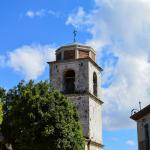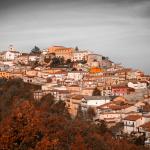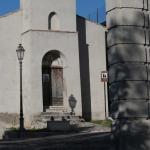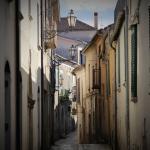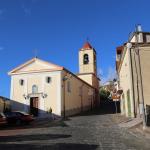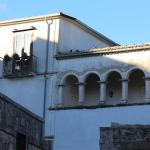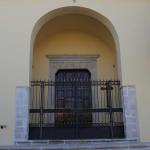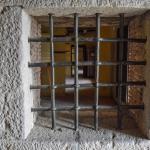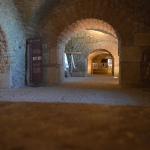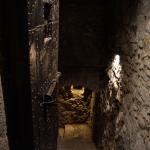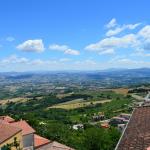The Municipality of Montefusco is located in the Calore Valley area. It's a village of 1,263 inhabitants, located 705 meters above sea level and 21 km from Avellino. Its territory extends for 8.24 sq km and the neighbouring municipalities are: Montemiletto, Pietradefusi, San Martino Sannita, San Nazzaro, San Nicola Manfredi, Santa Paolina and Torrioni.
The etymology of the name comes from the union of Mons and Fusculi, or "Mount of Foscolo", a Roman or Lombard character who owned the mountain or founded the Castle. The inhabitants are called Montefuscani or Fuscolomontani and the Holy Thorn is their recurring event.
PLACES OF INTEREST
- Bourbon Castle-Prison - Built in Norman times, it was adapted to prison functions during the Aragonese domination
- Oratory of San Giacomo - Ancient crypt of the Abbey Church of Santa Maria della Piazza
- Giordano Palace - Example of 17th-century architecture, still preserved today in its originality
- Civic Tower - It stands on Largo Castello and represents one of the main attractions of the village
- Church of San Francesco d'Assisi (Saint Francis of Assisi) - Dating back to the 13th century, it's distinguished by the richness and value of marbles, paintings and statues
- Church of San Giovanni del Vaglio (Saint John) - Large and harmonious church with a nave and two aisles, it offers underground access to a chapel decorated in stucco with 18th century frescoes
- Church of San Bartolomeo - Located in the west area, it dates back to 1221 and is one of the oldest religious buildings dedicated to Saint Bartholomew
- Sanctuary of Madonna del Carmine (Our Lady of Mount Carmel) - Destination for pilgrims from all neighbouring countries
- Church and Monastery of Santa Caterina da Siena (Saint Catherine of Siena) - The complex dates back to the 17th century and currently serves as a convent
- Convent of the Capuchin Friars with the cell of Saint Pius - It rises in the locality of Sant'Egidio and, together with the Church, it creates a single complex
- Ruggiero-De Antonellis Palace - The Palace preserved a well-cistern
- Montefusco woods - Site of community interest, characterized by the presence of Apennine hills interspersed with small streams
EVENTS
- Festival of the Holy Thorn - Celebrations and moments of prayer, on the occasion of the anniversary (3rd of May) and the third week of the month
- Saint Giles Fair - Folklore and food and wine event with the "scesa della bannera" tradition, scheduled for August
- Living Nativity Scene - Realistic reproduction of the Christmas nativity scene and its characters, scheduled for December
- Feast of Our Lady of Mount Carmel - Religious celebrations, scheduled in August
TYPICAL FOOD AND PRODUCTS
- Fusilli alla francescana - Ancient recipe of the Capuchin Fathers of the Convent of Sant'Egidio
- Greco di Tufo DOCG - Noble wine deriving from an ancient grape variety, of Greek origin, with unparalleled typicality, affirmed all over the world for aromas and flavour
- Irpinia Colline dell'Ufita PDO - Extra virgin olive oil deriving largely from the Ravece variety, characterized by a pleasant bitter and spicy taste
- Pork - Traditional second course, usually accompanied by peppers
- Caciocavallo Silano PDO - Semi-hard cheese, with spun curd, produced with milk from various cows, including Podolica
FUN FACTS
The castle and former Bourbon prison is also the current Town Hall of Montefusco.
The former Bourbon Prison of Montefusco is defined as the "Spielberg of Irpinia" for the cruelty of the penalties inflicted on prisoners.
HISTORICAL NOTES
Many difficulties have been encountered in tracing the history of Montefusco up to the Lombard age, the period in which its ascent began in the absence of written sources, given that, on the top of the mountain, there had already been settlements prior to the coming of the Lombards. In fact, according to the historical tradition, in the 9th century, the Lombards fortified the walls of a Castrum already present in the area, thus transforming it into a real castle.
In 1130, with Roger II, Montefusco became a "royal castle", a role reserved for important fortresses from a strategic-military point of view: precisely in this period, it may have fulfilled the function of temporary residence of Popes and kings. With the arrival of the Angevins, it became a royal and state territory "in perpetuity" and was named the capital of the Ultra Principality. Under the Aragon reign, the Provincial Royal Audience was founded for civil, criminal and military cases and the Castle was transformed into a prison. The first problems began to gather on the horizon of the Principality capital, when it was involved in the revolt of Masaniello, which was joined by the plague of 1656 and the earthquake of 1688.
These events marked a period of decline that crossed the 18th century, having its epilogue at the beginning of the 19th century. In fact, in 1806 the French transferred the capital of the Principality to Avellino, which, in fact, took place in 1816.
"Chi trase a Montefusco e po' se n'esce, pò dì che nata vota nterra nasce" (Who comes to Montefusco and then leaves, can say to be born again), a motto full of stories to be revealed
Montefusco
Piazza Castello, 9/15, 83030 Montefusco AV, Italia
Did you like it? Leave a review
Your opinion is important! It will be visible after approval by the editorial staff.
To post a comment you must be an authenticated user. Log in with Social Login
